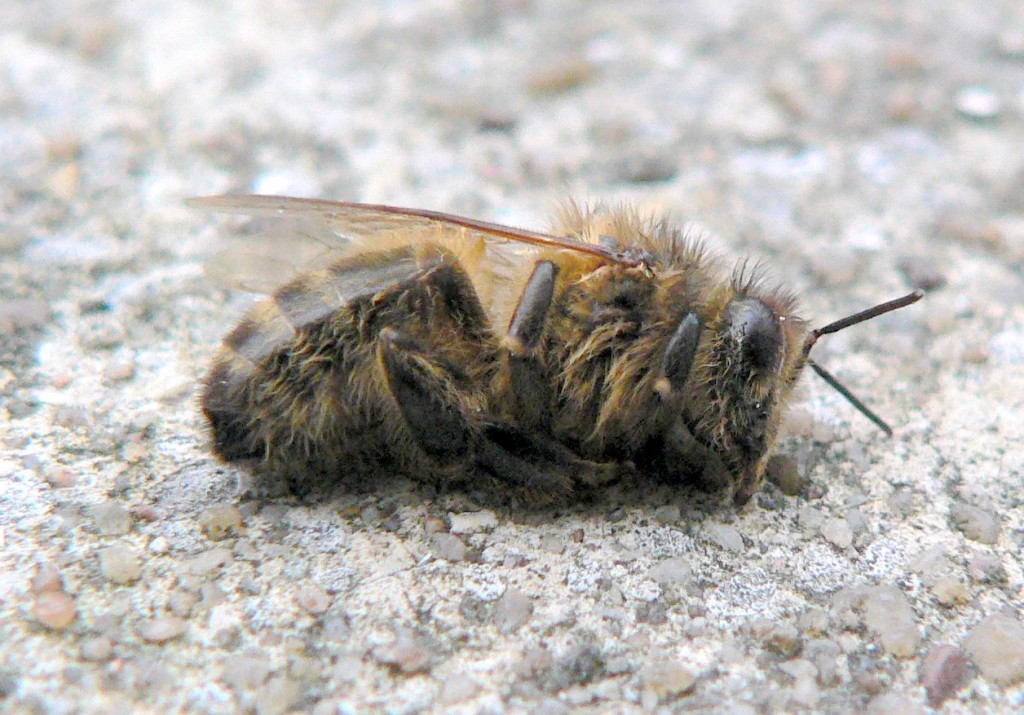Podcast: Play in new window | Download
Subscribe: RSS

A world soaked in insecticides is not a place where bees can live. We’re really going to miss them. (Wikimedia photo)
Call it the Return of Silent Spring. Rachel Carson’s 1962 book of that name aroused the world to the dangers of soaking the world with insecticides (at the time, primarily DDT). Her dark vision of a spring in which no birds sang nor insects buzzed gave impetus to the environmental movement. What better evidence that that movement has been rolled up like a cheap rug than the news that after half a century we are back where we started?
According to a major new study, the world is so saturated with insecticides (especially these days, the pervasive neonicotinoids) that bees and earthworms are vanishing. As they go, they will take our food supply with them.
The latest sneeze in mass extinction — the neonicotinoids — are neurotoxins (think nerve gas) that are chemically similar to nicotine (how appropriate is that?). As is its wont, industrial agriculture does not use this poison on infested crops, but on all crops, lest they become infested. They soak the seeds in it, so that all parts of the growing plant are infused with it, and any critter that sucks its sap or gnoshes on its leaves will die. The technique is similar to the preventive administration of antibiotics to animals, and has similarly catastrophic consequences.
Turns out that not only the sapsuckers, but the pollinators, are poisoned by this stuff, which is now widely implicated in the decline of the world’s bees. Moreover, the worms that till and enrich the soil beneath the plant are poisoned. So the critters that make the crop possible are killed right along with the critters that attack the crop. Another victory in the war on bugs.
The toxicity of these neonics, to use the scientific slang, is impressive. According to the study, some neonics are at least 5,000 to 10,000 times more toxic to bees than DDT.But in addition, they can persist in the soil for years, making subsequent applications cumulative in their effect– something that seems to have just dawned on the ever-vigilant community of scientists who get money for their studies from Big Agriculture (the present study is a survey of the world’s peer-reviewed literature on the subject).
The study says:
It is clear that present day levels of pollution with neonics resulting from authorized uses, frequently exceed ‘lowest observed adverse effect concentrations’ for a wide range of non-target species and are thus likely to have large scale and wide ranging negative biological and ecological impacts.
Translation: brace for hunger.
Confucius said, “Among people those born with knowledge are the very best. Next come those who acquire knowledge through study. Those who learn through difficult experience are still next, and finally those who just refuse to learn are the most hopeless.” (Analects 16:9)
Big Ag only concerns itself with short-term profits at any expense, including the living biosphere. It matters not to these profiteers that they are actively destroying the elements of life itself. No bees means no food. 40% of our food crops are pollinated by bees. Worms aerate and fertilize the soil.
Monsanto should be shut down, globally. The world does not need a mega-national “helping” us destroy the food chain. We could revert to small-scale farms again (which are far more productive the the massive monocultures using Roundup and other toxins).
But none of this will happen, so expect famine.